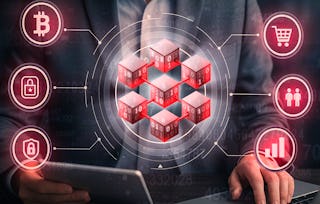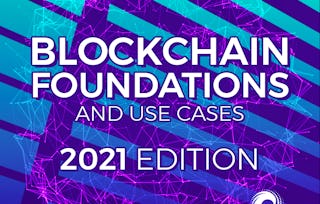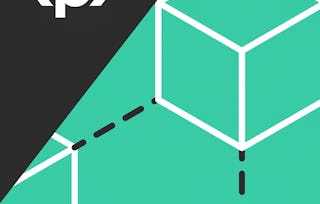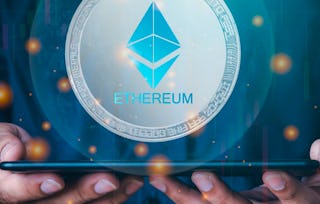Dive into the transformative world of blockchain with our course, designed to navigate the complexities of digital currencies, smart contracts, and decentralized applications. Whether you're intrigued by Bitcoin, Ethereum, or the broader implications of blockchain for industries and governance, this course offers deep insights and practical knowledge to leverage blockchain technology for innovation and problem-solving. Perfect for both beginners and seasoned enthusiasts, it's your gateway to mastering the blockchain ecosystem and its burgeoning impact on the digital age.

Blockchains, Tokens, and The Decentralized Future

Blockchains, Tokens, and The Decentralized Future

Instructor: Robert J. Brunner
1,688 already enrolled
Included with
Recommended experience
What you'll learn
Gain a comprehensive understanding of blockchain technology, including its cryptographic foundations and the importance of hashing.
Develop an in-depth knowledge of the two leading blockchain platforms, Bitcoin and Ethereum, and the challenges they face.
Examine the transformative potential of blockchain across different sectors, including finance, health care, governance, and nonprofits.
Develop a critical understanding of the regulatory environment surrounding blockchain technology.
Skills you'll gain
- Interoperability
- Data Security
- Payment Systems
- FinTech
- Ledgers (Accounting)
- Scalability
- Case Studies
- Cryptography
- Digital Assets
- Governance
- Transaction Processing
- Blockchain
- Regulation and Legal Compliance
- Cyber Governance
- Emerging Technologies
- Distributed Computing
- Skills section collapsed. Showing 12 of 16 skills.
Details to know

Add to your LinkedIn profile
25 assignments
See how employees at top companies are mastering in-demand skills

There are 4 modules in this course
The first module explores the core concepts of blockchain, the revolutionary technology powering cryptocurrencies like Bitcoin. You will gain an understanding of how distributed ledgers revolutionize data security, transparency, and trust in various industries. The module continues to demystify the cryptographic building blocks that ensure secure and verifiable transactions on blockchain networks. As the module goes further, we will explore the intricacies of Bitcoin transactions, wallets, and the consensus mechanism that maintains network integrity. Later in this module, we will uncover the technical foundations of the Bitcoin network, including Proof of Work and its implications. You will gain hands-on experience with Bitcoin transactions by using a blockchain explorer. In the end, we will analyze the challenges and opportunities presented by Bitcoin, including the promising Lightning Network. By the end of this module, you will be equipped with a strong understanding of blockchain technology, its potential for disruption, and how Bitcoin fits into the larger financial landscape. This knowledge will enhance your ability to evaluate blockchain-based ventures, navigate emerging financial trends, and make informed decisions in a rapidly evolving technological landscape.
What's included
20 videos6 readings7 assignments1 discussion prompt1 plugin
The second module covers the evolution and technological advancements of Ethereum, exploring its foundational concepts, the development of smart contracts, decentralized applications (DApps), and the significant transition from the proof-of-work to the proof-of-stake consensus mechanism. You will explore Ethereum's history, its role in creating a decentralized web, the challenges of scalability and privacy, and the introduction of zero-knowledge proofs to enhance security and efficiency. Innovations in Ethereum's ecosystem, such as novel implementations of the Ethereum Virtual Machine (EVM) and cryptographic techniques like zero-knowledge proofs, are highlighted for their potential to revolutionize smart contracts by ensuring privacy, reducing transaction costs, and improving execution speed. The module emphasizes Ethereum's impact on fostering trustless transactions and its ongoing research areas aimed at overcoming the limitations of current blockchain technologies, illustrating Ethereum's pivotal role in shaping the future of decentralized finance and applications.
What's included
16 videos2 readings6 assignments
Module 3 offers a comprehensive exploration into various facets of the blockchain and Web3 technologies, highlighting their potential to revolutionize the digital landscape. Module 3 introduces Non-Fungible Tokens (NFTs), presenting case studies on POAP, ENS, CryptoKitties, and the Bored Ape Yacht Club. You will also explore how NFTs leverage Ethereum's smart contracts to authenticate ownership, demonstrate provenance, and manage the scarcity of digital assets, ranging from art to domain names. The discussion extends to platforms like OpenSea and Etherscan, illustrating how they facilitate interaction with NFTs on the blockchain, thereby underscoring the burgeoning diversity and creativity within the NFT ecosystem. Module 3 further explores Decentralized Autonomous Organizations (DAOs), introducing Aragon as a tool for creating and managing DAOs, and introduces Web3 projects such as Ocean Protocol, Audius, and Decentraland. These lessons shed light on how DAOs offer a novel approach to governance, leveraging blockchain technology to enable a decentralized and autonomous organizational structure. Meanwhile, Web3 projects are presented as exemplars of how blockchain technology empowers users with greater control over data, enhances digital content ownership, and fosters direct creator-consumer connections. Collectively, module 3 offers a glimpse into the transformative potential of blockchain and Web3 technologies, suggesting a future where digital interactions are more decentralized, transparent, and user-centric.
What's included
14 videos2 readings6 assignments
Module 4 provides an in-depth look at blockchain technology’s transformative nature of decentralization and its applications in different sectors such as governance, finance, health care and nonprofits. It starts with its foundational impact on digital governance, emphasizing decentralized government, digital identities, and voting mechanisms. It showcases blockchain's versatility in sectors like healthcare, supply chain, and beyond, while also considering its integration with AI and IoT for innovative solutions. The module explores blockchain's role in promoting sustainable development, environmental conservation, financial inclusion, and economic empowerment, highlighting its potential to enhance transparency, efficiency, and access across global communities. Through theoretical and practical insights, learners are equipped to understand and engage with the complex implications of blockchain's expanding influence.
What's included
18 videos4 readings6 assignments1 peer review1 plugin
Build toward a degree
This course is part of the following degree program(s) offered by University of Illinois Urbana-Champaign. If you are admitted and enroll, your completed coursework may count toward your degree learning and your progress can transfer with you.¹
Instructor

Offered by
Explore more from Leadership and Management
 Status: Preview
Status: PreviewMacquarie University
 Status: Preview
Status: PreviewConsenSys Academy
 Status: Free Trial
Status: Free Trial Status: Free Trial
Status: Free Trial
Why people choose Coursera for their career

Felipe M.

Jennifer J.

Larry W.

Chaitanya A.

Open new doors with Coursera Plus
Unlimited access to 10,000+ world-class courses, hands-on projects, and job-ready certificate programs - all included in your subscription
Advance your career with an online degree
Earn a degree from world-class universities - 100% online
Join over 3,400 global companies that choose Coursera for Business
Upskill your employees to excel in the digital economy
Frequently asked questions
Once you enroll for a Certificate, you’ll have access to all videos, quizzes, and programming assignments (if applicable). If you choose to explore the course without purchasing, you may not be able to access certain assignments.
You will be eligible for a full refund until 2 weeks after your payment date. You cannot receive a refund once you’ve earned a Course Certificate, even if you complete the course within the 2-week refund period. View our full refund policy.
Yes! Coursera provides financial aid to learners who would like to complete a course but cannot afford the course fee. To apply for aid, select "Learn more and apply" in the Financial Aid section below the "Enroll" button. You'll be prompted to complete a simple application; no other paperwork is required.
More questions
Financial aid available,

